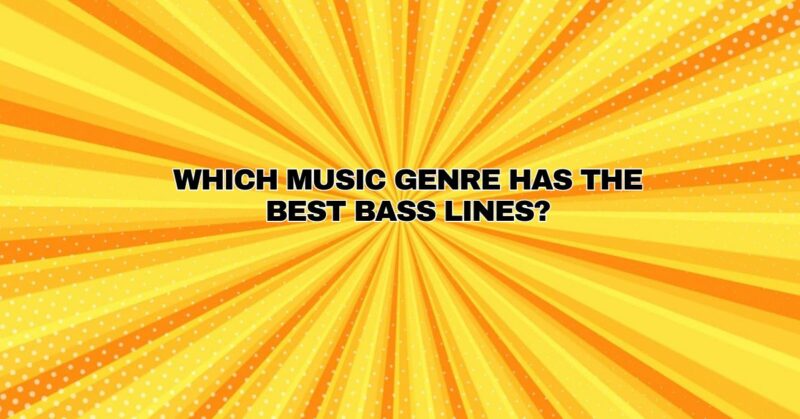In the vast and diverse landscape of music, the role of the bass guitar and its lines cannot be understated. Bass lines provide the rhythmic backbone, groove, and depth to songs, enhancing the overall listening experience. But which music genre boasts the best bass lines? This is a subject of endless debate among music enthusiasts. In this comprehensive article, we will take a journey through various music genres, exploring their unique bass lines and attempting to answer the question of which genre has the best bass lines.
The Universal Language of the Bass
Before we embark on our exploration of different music genres, it’s essential to understand the fundamental role of the bass guitar and its lines in music:
- Rhythmic Foundation: The bass guitar serves as the rhythmic foundation of a song, working in tandem with the drummer to establish the groove and pulse.
- Harmonic Depth: Bass lines add harmonic depth by providing the low-end frequencies that complement the melodies and chords played by other instruments and vocalists.
- Expressive Versatility: Bassists have the ability to infuse their lines with a wide range of techniques, including slapping, popping, fingerstyle, and more, allowing for expressive versatility.
Now, let’s delve into various music genres and explore the standout characteristics of their bass lines:
1. Funk
- Groove Pioneers: Funk music is renowned for its infectious and danceable bass lines. Funk bassists, such as Bootsy Collins and Larry Graham, are known for their mastery of slap bass technique and creating irresistibly funky grooves.
- Prominent Role: In funk, the bass guitar often takes center stage, driving the rhythm and acting as a lead instrument with its intricate and syncopated lines.
2. Jazz
- Harmonic Complexity: Jazz bass lines are characterized by their harmonic complexity and improvisational nature. Jazz bassists navigate intricate chord changes and add walking bass lines that contribute to the genre’s rich sound.
- Double Bass Tradition: Jazz has a strong tradition of double bass, which brings a warm, acoustic resonance to the genre’s bass lines.
3. Reggae
- Rooted in Rhythm: Reggae bass lines are deeply rooted in rhythm and groove. The “one-drop” rhythm pattern, where the bass emphasizes the third beat, is a hallmark of reggae bass playing.
- Simplicity with Impact: Despite their simplicity, reggae bass lines have a profound impact, creating the laid-back and hypnotic feel that defines the genre.
4. Rock
- Driving Force: In rock music, the bass guitar often serves as the driving force behind the band’s sound. Iconic rock bass lines, like those in Led Zeppelin’s “Dazed and Confused” or Queen’s “Another One Bites the Dust,” are instantly recognizable.
- Variety of Styles: Rock encompasses a wide range of subgenres, from classic rock to heavy metal, each with its unique approach to bass playing. Heavy metal, for instance, features fast, aggressive bass lines, while classic rock often emphasizes melodic, catchy bass hooks.
5. Hip-Hop
- Sample-Based Grooves: Hip-hop bass lines often draw from funk and soul, with producers frequently sampling iconic bass riffs and grooves. These sampled lines form the backbone of many hip-hop tracks.
- 808 Bass: The Roland TR-808 drum machine’s synthesized bass sound has become synonymous with hip-hop. Its deep, booming bass lines are a hallmark of the genre.
6. Latin and Afro-Cuban
- Rhythmic Complexity: Latin and Afro-Cuban music showcase bass lines with intricate rhythmic patterns that interlock with percussion instruments. Bassists in these genres play a pivotal role in maintaining the pulse of the music.
- Syncopation and Percussive Techniques: Bassists in Latin music employ syncopation and various percussive techniques, such as slap and muted notes, to create dynamic and rhythmically charged bass lines.
7. Electronic Dance Music (EDM)
- Synthesized Bass: In the realm of EDM, synthesized bass lines take center stage. These bass lines are created using synthesizers and software instruments, allowing for a wide range of textures and sounds.
- Driving Energy: EDM bass lines provide the driving energy that fuels dancefloors around the world. Genres like techno and house are known for their pulsating and hypnotic bass patterns.
Conclusion
The question of which music genre has the best bass lines is ultimately subjective and depends on individual preferences. Each genre brings its unique flavor to the world of bass playing, from the funky grooves of funk to the harmonically rich lines of jazz, the rhythmic pulse of reggae, the driving force of rock, the sample-based creativity of hip-hop, the percussive intricacies of Latin music, and the synthesized textures of EDM.
What makes bass lines exceptional often lies in the skill and creativity of the bassists who craft them, as well as the cultural and historical context of the music. So, whether you’re drawn to the infectious funk of James Brown’s basslines


